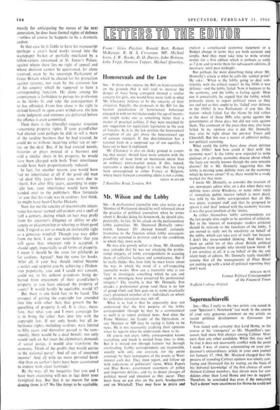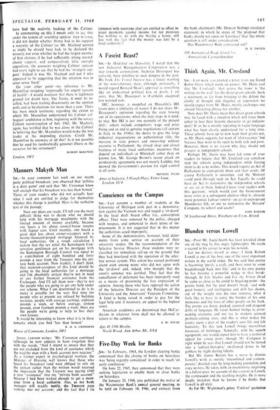Supermach iavelli SIR,—May I reply to the two points you
raised in your 'Spectator's Notebook' last week in the course of your very generous comment on my article on recent political development in Encounter for February.
You stated with certainty that Lord Home, in the course or his 'emergence' as Mr. Macmillan's suc- cessor, had more first choices among Cabinet Mini- sters than any other candidate. While this may well be true it does not necessarily conflict with the point I made. I was. of course, commenting on your pre- decessor's extraordinary article in your own journal for January 17, 1964. Mr. Macleod charged that the process of sounding Cabinet opinion was utterly con- fusing and illustrated this by stating, on the basis of his 'personal knowledge' of the first choices of some thirteen Cabinet members, that eleven were for can- didates other than Lord Home and two in support. Therefore, he concluded that even if the remaining 'half a dozen' were unanimous for Home he could not have had the majority backing of the Cabinet.
In commenting on this I meant only to say that under the system of 'sounding opinion' then in force, it did not matter whether Home had in his support a majority of the Cabinet (as Mr. Macleod seemed to imply he should have had, to be declared the winner), nor even whether he had the largest number of first choices; if he had sufficiently strong second- choice support, and comparatively little outright opposition. the assessors weighing Cabinet opinion had every right to say that he had the 'strongest sup- port.' Indeed it was Mr. Macleod and not I who appeared to be suggesting that the selection was in some sense 'fixed.'
On your other point—my reference to Mr. Macmillan resigning 'supposedly for urgent reasons of health'-1 would maintain that there is legitimate ground for doubt here. The Tories. it must be re- called, had been trailing disastrously on the opinion polls and at by-elections for more than a year. There has been much testimony regarding the extent to which Mr. Macmillan undermined his Cabinet col- leagues' confidence in him, beginning with the savage Cabinet reconstruction of July 1962. Mr. Macleod, again, has testified that he was alone in the Cabinet in believing that Mr. Macmillan would make the best leader at the impending election. Could Mr. Macmillan be unaware of all this? Is it not possible that he used his (undoubtedly genuine) illness as the occasion for his retirement?
ROBERT MCKENZIE
London, SW3



































 Previous page
Previous page